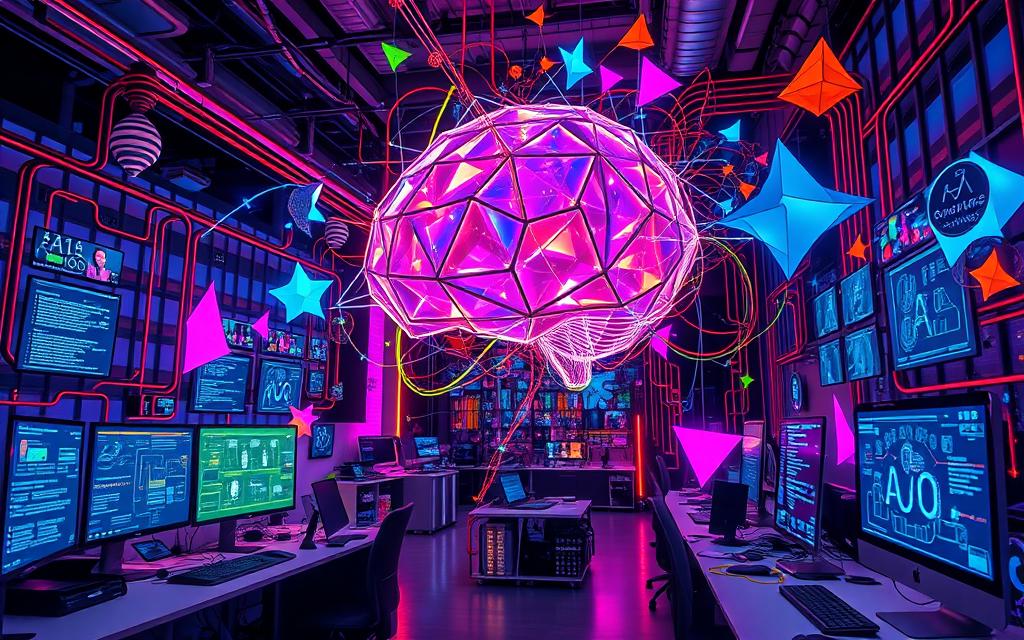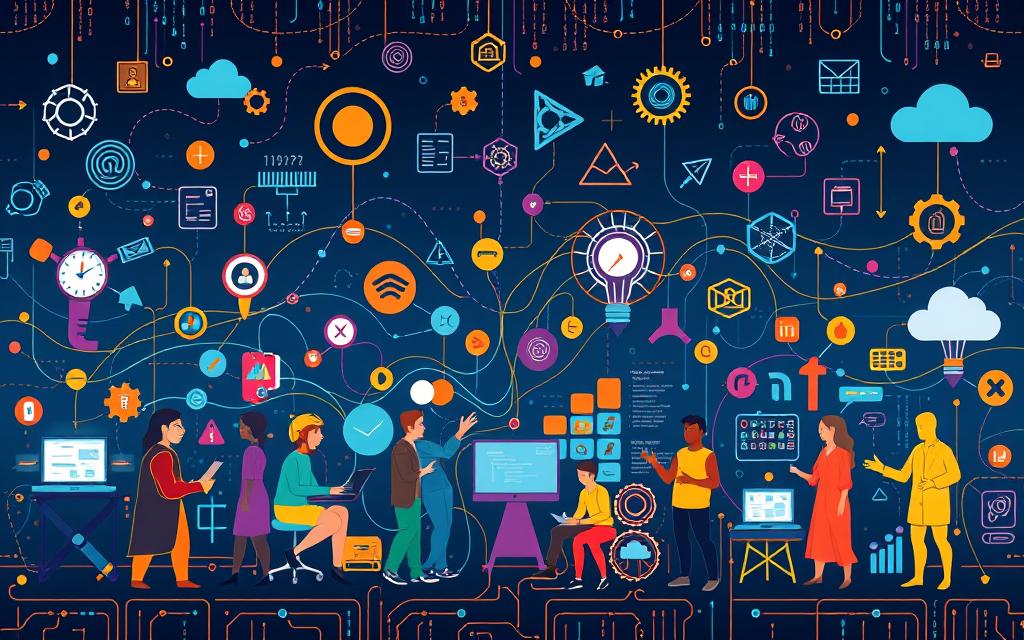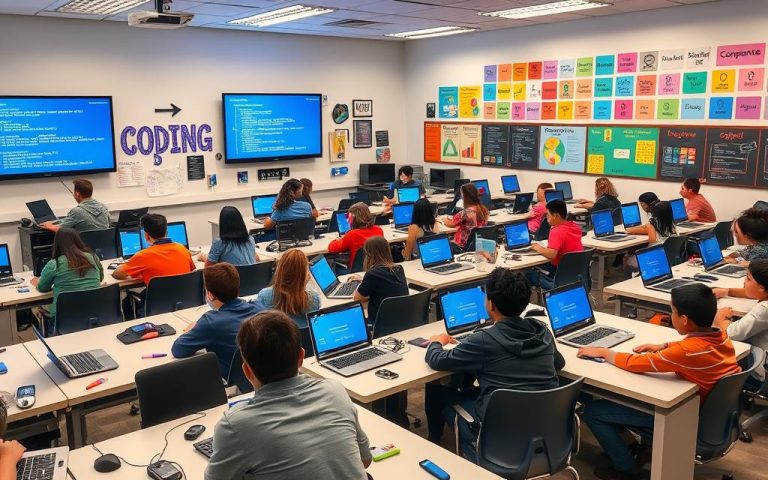What Valuable Skills Can You Gain From Studying Computer Science?
Studying computer science gives you many useful skills. You learn technical skills like programming and software development. You also gain soft skills like communication and teamwork.
These skills are key in today’s fast-changing digital world. Companies want people with strong computer science, technical, and soft skills. They need these skills to innovate and grow.
Getting these skills boosts your job chances. Computer science graduates are in high demand. They have many career options, like Computer and Information Scientists, Computer Programmers, and Software Developers. These jobs offer good pay and chances to advance.
Understanding What Skills Computer Science Actually Teaches You
Computer science covers a wide range of skills. It includes technical skills and soft skills. At its heart, it’s about creating and testing programs. Programming languages are key, with skills in Java, C, Python, and JavaScript.
It also focuses on data structures and algorithms. These are the building blocks of computer science.
But it’s not just about coding. It also teaches soft skills like communication, teamwork, and problem-solving. These are vital for working well in a team and solving complex problems.
Software development is another big part of computer science. It involves designing, making, and testing software systems.
Technical Competencies Overview
Some key technical skills in computer science are:
- Proficiency in programming languages
- Understanding of data structures and algorithms
- Knowledge of software development principles
- Familiarity with database management systems
Soft Skills Development
Soft skills are also critical in computer science, including:
- Effective communication
- Teamwork and collaboration
- Problem-solving and analytical thinking
- Time management and organization
Academic Foundation Elements
A solid foundation in computer science needs a strong grasp of math. This includes mathematical theories, statistics, calculus, and linear algebra. It also requires knowledge of algorithms and data structures.
Proficiency in programming languages and software development is also essential.
Mastering the Art of Problem-Solving Through Computing
Strong problem-solving skills are key to success in computer science. They help us think critically and solve complex problems. By studying computer science, we learn to tackle various challenges.
Key problem-solving skills in computer science include:
- Breaking down big problems into smaller parts
- Writing efficient code that runs fast and uses less resources
- Fixing bugs and errors in our code
Experts say problem-solving is vital in programming. Critical thinking and analytical reasoning are must-have skills for solving tough problems. Doing coding challenges and working with others helps improve these skills.

As computer science skills become more in demand, being good at solving problems is essential. Mastering problem-solving through computing opens up great career paths. It also keeps us ahead in a world that’s getting more digital by the day.
| Skill | Importance | Application |
|---|---|---|
| Problem-solving | High | Programming, debugging, optimization |
| Critical thinking | High | Analysis, design, development |
| Analytical reasoning | High | Problem-solving, decision-making, troubleshooting |
Essential Programming and Coding Proficiency
Being good at programming languages is key for computer scientists. It means knowing how to use object-oriented programming, web development, and mobile app making. Studying computer science helps you get these skills and use them in many ways.
Writing clean, efficient code is important. You need to know programming languages and object-oriented programming well. Also, knowing web development tools is vital for making cool web sites.
Some key skills for coding include:
- Being good at programming languages like Java, Python, and C++
- Understanding object-oriented programming
- Knowing web development tools like HTML, CSS, and JavaScript
- Experience in making mobile apps for Android and iOS
These skills open doors to many jobs in computer science. You can work in web development, mobile apps, data science, or artificial intelligence. With more jobs needing programmers, knowing how to code is very important.
| Skill | Importance | Description |
|---|---|---|
| Programming languages | High | Proficiency in languages such as Java, Python, and C++ |
| Object-oriented programming | High | Understanding of OOP principles and concepts |
| Web development | Medium | Knowledge of web development frameworks and technologies |
Data Analysis and Algorithmic Thinking
Learning to analyze data is key for computer science students. They need to understand data structures and algorithms. This skill helps them solve complex problems.
By studying computer science, students can improve their data analysis skills. They learn to tackle various problems effectively.
According to Learning.com, computational thinking is all about solving problems step by step. It’s about breaking down big problems into smaller ones. This makes it easier to find solutions.
Some important skills for data analysis and algorithmic thinking are:
- Decomposition: breaking down complex problems into smaller parts
- Pattern recognition: identifying connections and similarities within a problem
- Abstraction: extracting pertinent information from decomposed problems to generalize solutions
- Algorithmic thinking: defining step-by-step solutions that can be replicated
Mastering these skills helps students create efficient algorithms and data structures. This is vital in today’s digital world. It’s essential for data scientists and those working with computers.
System Design and Architecture Understanding
Understanding system design and architecture is key for computer science students. It involves mastering database management, network architecture, and cloud computing. Studying computer science helps develop these skills for solving various problems.
A solid base in system design is vital for making efficient systems. It covers scalability, reliability, and performance. Programming languages like Python, Java, and JavaScript are also important.

Tools like Draw.io and Lucidchart are essential for system design. They help developers create and test systems. Online platforms like Coursera and Udacity also offer courses to learn system design.
Database Management Skills
Database management is a key part of system design. It includes learning database basics and designing efficient databases.
Network Architecture Knowledge
Network architecture is also vital for system design. It involves understanding networking basics and designing efficient networks.
| System Design Concepts | Description |
|---|---|
| Scalability | The ability of a system to handle increased load and traffic |
| Reliability | The ability of a system to perform its intended function consistently |
| Availability | The ability of a system to be accessible and usable when needed |
Project Management and Collaboration Abilities
Having strong project management skills is key in the computer science world. You need to know about frameworks like Agile or Scrum. Also, being able to manage projects well is important. Collaboration and teamwork are vital too. They help you work well with others and reach your goals together.
Some important skills for project management and teamwork are:
- Communication
- Time Management and Organization
- Leadership
- Problem Solving
- Critical Thinking
- Adaptability
- Conflict Resolution
Companies that focus on collaboration do better. They are 5 times more likely to excel. A study by McKinsey & Company found that teams that work well together can do up to 20% better. 
Working on your project management and collaboration skills can boost your career in computer science. You can get better by practicing, learning, and being open to new ideas. As teamwork becomes more important, it’s key to develop these skills to stay competitive.
| Skill | Importance |
|---|---|
| Project Management | High |
| Collaboration | High |
| Teamwork | High |
Critical Thinking and Analytical Reasoning
For computer science students, developing critical thinking and analytical skills is key. These abilities help them evaluate information, spot patterns, and make smart choices. Through studying computer science, they can improve their critical thinking. This includes logical assessment, mathematical reasoning, and recognizing patterns.
Logical assessment is vital in computer science. It helps in designing and checking algorithms, proofs, and programs. Mathematical reasoning is also key. It helps in finding and testing theories, learning from data, and solving problems. Pattern recognition is important too. It lets them find and study complex data patterns.
Key Skills for Computer Science Students
- Logical assessment: designing and verifying algorithms, proofs, and programs
- Mathematical reasoning: discovering and testing hypotheses, learning from data, and generalizing solutions
- Pattern recognition: identifying and analyzing complex patterns in data
By honing these skills, computer science students can improve their problem-solving. They can also check information’s truth and make better decisions. These skills are vital for a career in computer science. They help in designing, creating, and keeping complex software systems running.
Critical thinking is critical in computer science. It helps in checking information’s truth, accuracy, and relevance. This avoids mistakes, biases, and fallacies. It also boosts decision-making and communication skills. By focusing on critical thinking and analytical reasoning, computer science students lay a solid base for a rewarding career.
Innovation and Creative Problem-Solving Techniques
Computer science students learn to be innovative and solve problems creatively. These skills are key for success in the field. They learn to use design thinking to find new solutions for different problems.
Design thinking focuses on solving problems with empathy and creativity. It’s useful in many areas, like software development and product design. It’s a skill that computer science students find very valuable.
Design Thinking Approaches
Design thinking involves several steps. First, you empathize with users. Then, you define problems and come up with ideas. After that, you create prototypes and test them. This way, students can come up with solutions that really work.
Prototype Development
Creating prototypes is a big part of innovation. It lets you test and improve your ideas quickly. Students can use prototypes to get feedback and make their designs better.
Some important skills for making prototypes include:
- Creativity and imagination
- Technical skills, such as programming and software development
- Communication and collaboration skills, to work effectively with users and stakeholders
By mastering innovation and problem-solving, computer science students can do well in many areas. They can create solutions that meet user needs and help businesses succeed.
| Skill | Description |
|---|---|
| Innovation | Developing new and innovative solutions to problems |
| Creative Problem-Solving | Applying design thinking approaches to develop innovative solutions |
| Design Thinking | A human-centered approach to problem-solving that emphasizes empathy, creativity, and experimentation |
Digital Security and Ethics Awareness
As technology gets better, digital security and ethics awareness are key for computer science students. With more cybercrimes, knowing cybersecurity and ethics is vital. Cybercrimes have jumped by 452.51% in five years, causing big financial losses.
A study by Augusta University shows how important cybersecurity and ethics awareness are. It stresses the need for strong digital security skills and ethical knowledge. This helps protect data and follow ethical rules, even with more cybersecurity threats.
Some key stats show why digital security and ethics awareness matter:
- Every day, about 328.77 million terabytes of data are made.
- Ransomware attacks in 2023 have seen a big jump, with losses likely to hit $898.6 million.
- The FBI found 800,944 cybercrime cases in 2022, costing $10.2 billion.
In summary, digital security and ethics awareness are essential for computer science students. By learning cybersecurity and ethics, they can protect data and grow in their careers. With 3.5 million cybersecurity job openings by 2025, the need for skilled people is growing fast.
Conclusion: Transforming Your Future with Computer Science Skills
Starting your journey in computer science shows you the power of your skills. Learning programming, data analysis, and problem-solving prepares you for many careers. This includes software development and cybersecurity.
The skills you gain in computer science open many doors. You can find jobs that match your interests and goals. Whether you want to be an innovator, data analyst, or problem-solver, computer science skills will help you succeed.
Don’t be afraid to take on new challenges. Expand your skills and discover what you can achieve. With hard work and a love for learning, computer science can lead to a rewarding and exciting future.
FAQ
What technical skills can you gain from studying computer science?
Studying computer science teaches you many technical skills. You learn programming languages, data structures, and algorithms. These are key for making and testing programs, and for working in software development and data analysis.
What soft skills can you develop through computer science studies?
Computer science also teaches soft skills. You learn to communicate well, work in teams, and solve problems. These skills help you work well with others and tackle complex problems.
What kind of academic foundation can you build through computer science?
Computer science gives you a solid academic base. You learn to solve problems using computing, think critically, and apply these skills to many situations.
How can you develop programming and coding proficiency through computer science?
Through computer science, you can become proficient in programming and coding. You learn programming languages, object-oriented programming, web development, and how to make mobile apps.
What data analysis and algorithmic thinking skills can you acquire?
Studying computer science sharpens your data analysis skills. You also learn about algorithms and data structures. These are vital for solving complex problems.
How can computer science studies enhance your system design and architecture understanding?
Computer science teaches you about database management, network architecture, and cloud computing. These skills are key for designing and understanding complex systems.
What project management and collaboration abilities can you gain?
Computer science helps you develop project management skills. You learn to work well in teams and collaborate. These are important for success in the field.
How can computer science studies improve your critical thinking and analytical reasoning?
By studying computer science, you improve your critical thinking and analytical skills. You learn to assess logically, reason mathematically, and recognize patterns. These skills are essential for thinking critically and analytically.
What innovation and creative problem-solving techniques can you learn?
Computer science teaches you design thinking and how to create prototypes. These skills are vital for innovation and solving problems creatively.
How can computer science studies enhance your digital security and ethics awareness?
Studying computer science boosts your understanding of cybersecurity and ethics. You learn how to protect sensitive information and make responsible digital decisions.







